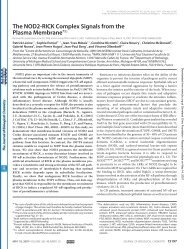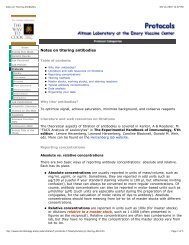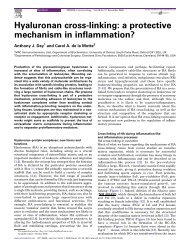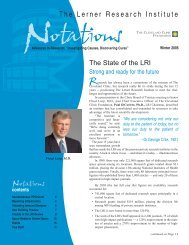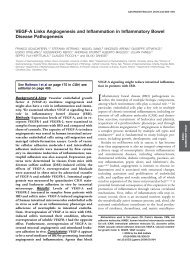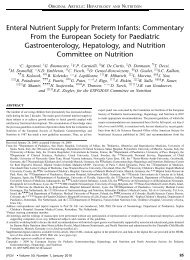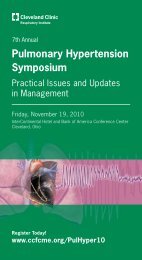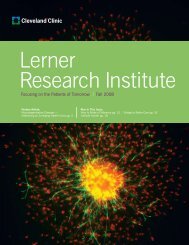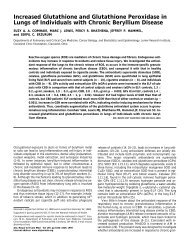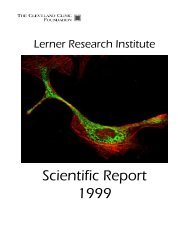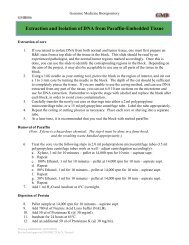Scientific Report 2003-2004 - Cleveland Clinic Lerner Research ...
Scientific Report 2003-2004 - Cleveland Clinic Lerner Research ...
Scientific Report 2003-2004 - Cleveland Clinic Lerner Research ...
- No tags were found...
You also want an ePaper? Increase the reach of your titles
YUMPU automatically turns print PDFs into web optimized ePapers that Google loves.
The Department of Molecular BiologySECTION ONVIROLOGYContinued from Page 102malignant transformation and is evolvingtowards development of new cancer treatmentapproaches.Recently, the Department was strengthenedby the newly organized laboratory led by ayoung structural biologist. Kwaku T. Dayie is anexpert in biomolecular NMR spectroscopymethods development and application to analysisof RNA-RNA and RNA-protein interactions.This work complements the Department’sexisting strengths in RNA synthesis/processingand signal transduction research.The laboratory of Peter Chumakovconducts active research programs in the p53tumor suppressor field. Chumakov, a pioneer ofthis area of molecular oncology, is pursuing aprogram of development of new anti-cancerp53-targeting pharmaceuticals based on uniquecellular model systems. A series of smallmolecules active against cervical cancer has beenrecently isolated, forming a solid basis for newanticancer drug development. This group is alsoinvolved in identification and functional analysisof new members of the p53 signaling pathway aspotential targets for anticancer treatment.The Department of Molecular BiologySection on Virology is comprised of investigatorswho specialize in and recognize the paramountimportance of investigating the molecular andimmunological bases of the infectious processesof human viruses. Understanding the fundamentalbasis of how viruses cause the disease processstill remains a colossal challenge to virologists.The Section on Virology’s includes three principalinvestigators who are dedicated to studying themechanisms of viral pathogenesis and to recruitvirologists to a interact and foster interdisplinaryresearch with physicians in the clinical departmentswith the <strong>Cleveland</strong> <strong>Clinic</strong> Foundation.Dr. Amiya K. Banerjee is the Head of theSection on Virology. Dr. Banerjee’s laboratory isinvolved in understanding the biosyntheticpathways underlying how the genetic material ofpathogenic viruses, e.g., vesicular stomatitis virusand human parainfluenza viruses, is expressedand regulated during their invasion of host cells.The laboratory’s primary goal is to understand themolecular basis of pathogenicity of these twoviruses, with an eye to developing antivirals andvaccines to combat these deadly viruses. Inaddition, research is being carried out to probeinto the molecular basis of pathogenicity ofhuman hepatitis virus C (Dr. Ashim K. Gupta)and to understand the mechanism of antiapoptoticfunctions of viral gene products (Dr.Nickolay Neznanov).Dr. Philip Pellet joined our Department asa senior Staff member early in <strong>2003</strong>. Dr. Pellet’sstudies aim to expand the fundamental understandingof the relationships among the variousherpesviruses, the processes by which humanherpesviruses replicate and persist in populationson an evolutionary time scale, and the mechanismsby which these viruses cause disease. As theDirector of Herpesvirus Translational and Basic<strong>Research</strong>, Dr. Pellet will lead research that willuse newly gained knowledge about herpesvirusbiology to prevent or treat herpesvirus-associateddisease.The laboratory of Dr. Miguel E. Quiñones-Mateu studies the molecular basis of variability,evolution and antiretroviral resistance of thehuman immunodeficiency virus (HIV). Thesestudies are directed to addressing the basic andclinically related questions with regard to HIVdynamics in AIDS patients undergoingantiretroviral therapy.Finally, the Gudkov laboratory is engagedin a broad research program involving gene anddrug discovery branches, mainly in the field ofcancer. The Gudkov program is aimed atidentification of modulators of apoptosis as anapproach to reduce cancer treatment side effectsand to cure other pathologies resulting from acutestresses. Scientists in the Gudkov laboratory aredeveloping and applying new gene discovery toolsbased on functional genetic technologies.Although the laboratory's program is primarilyfocused on cancer treatment applications thedeveloped methodologies are applicable foridentification of molecular targets in variousdiseases-an opportunity that is being aggressivelyexplored in collaboration with clinical Departmentsof CCF. Drug Screening Core that wasrecently organized in the Department acts as apowerful technological tool for facilitation oftranslational aspects of laboratory research byproviding services in chemical library screening fordrug discovery programs in a variety of fieldsexplored by the scientists from Molecular Biologyand other Departments of LRI.In summary, the Department of MolecularBiology combines basic and translational researchcovering a whole range of problems, fromunderstanding the basics of cell regulation todevelopment of clinically useful pharmaceuticals.Our productive laboratories, led by nationallyrecognized principal investigators, are taking awell-defined course towards strengtheningdisease-oriented translational research programs incollaboration with other divisions of the<strong>Cleveland</strong> <strong>Clinic</strong>.Dept. website: http://www.lerner.ccf.org/molecbio/SECTION HEADAmiya K. Banerjee, Ph.D.STAFFPhilip E. Pellett, Ph.D.ASSISTANT STAFFMiguel E. Quiñones-Mateu, Ph.D.PROJECT STAFFAshim K. Gupta, Ph.D.Nickolay Neznanov, Ph.D.RESEARCH ASSOCIATESJing Gao, M.D., Ph.D.Manjula Mathur, Ph.D.103



